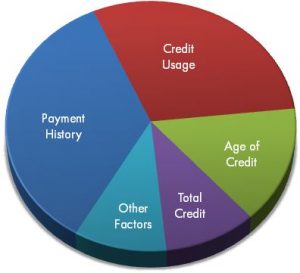What is a CREDIT SCORE:
A numerical expression based on an analysis of a person’s credit files, to represent the creditworthiness of the person and predict risk, specifically, the chance of borrowers becoming seriously delinquent on credit obligations in the 24 months after scoring. Lenders, such as banks and credit card companies, use credit scores to evaluate the potential risk and mitigate losses due to bad debt.
The dominant credit score lenders use is called the FICO credit score. According to myFICO.com, “90 percent of all financial institutions in the U.S. use FICO scores in their decision-making process.” FICO scores range from 300 to 850, where a higher number indicates lower risk. In addition, each consumer has three FICO scores, one for each credit report provided by the three major credit bureaus: Equifax, Experian and TransUnion.
According to BankRate.com, here are “7 ways to improve your credit score”:
- Watch those credit card balances.
- Eliminate credit card balances.
- Leave old debt on your report.
- Use your calendar.
- Pay bills on time.
- Don’t hint at risk.
- Don’t obsess.
SPECIAL NOTE: Federal law mandates the consumer’s right to a free credit report annually from each credit reporting agency, but not to a free credit score. To get your exact number, you have to purchase it from a score provider, such as myFICO.com or one of the reporting agencies.
Credit Report Info Credit Score Info
Here are the components that make up your credit score. Scroll down to learn more!

What Makes up a FICO score?
Payment History (35%)
- Payment History has a high impact on your score.
- Your payment history plays a critical part in determining your score. Making your payments on time shows potential lenders how reliable you are in paying back what you owe. Be sure to make all of your payments on time (even if it’s just the minimum payment due), and remember that other types of credit payments such as those for student loans and auto loans affect your score.
- Just a few missed payments (2-3%) can greatly impact your score: Excellent (100%), Good (99%), Not Bad (98%), Poor (<98%)
Credit usage (30%)
- Credit Card Usage has a high impact on your score.
- Your credit usage makes up to 30% of your credit score. Unlike other credit attributes, credit usage has no history and is re-calculated every month
- Credit Card Usage shows how much you spend on your credit cards as a percentage of your total available balances (your credit limits) for all of your credit cards. A high percentage could indicate that you don’t have your spending under control and could be a greater risk for defaulting on your payments. Try to keep your credit card usage under 30%
- Excellent (0-20%), Good (21-40%), Not Bad (41-60%) , Poor (61-100%)
Age of Credit (15%)
- Age of Credit has a medium impact on your score.
- Age of Credit is the average amount of time you’ve had all of your open credit accounts. It measures the longevity of your credit history. Opening several accounts in a short period of time may indicate a great level of risk, so avoid opening lots of credit accounts unless you really need them. Be sure, also, to keep your old accounts open with a good payment history for each.
- Excellent (0-3 years), Good (3-6 years) Not Bad (6-9 years), Poor (9+ years)
Derogatory Marks
- Derogatory Marks have a high impact on your score.
- Derogatory Marks are indications of poor behavior in the past when it comes to being responsible about credit. These include accounts in collection, liens, and bankruptcies—things potential creditors are definitely wary about.
- Sometimes things happen and they’re beyond your control but if you can, by all means do your best to keep these things from happening. No matter the reason, these negative marks will likely stay on your credit report for seven years or more.
- Excellent (0), Good (1), Not Bad (2), Poor (3+)
Total Accounts (Includes Open and Closed)
- Total Accounts has a low impact on your score.
- Total Accounts is the number of accounts you have, which may be an indicator of how credit worthy lenders think you are. Don’t go crazy and open a lot of accounts, though, because the average age of credit is more significant than number of accounts when calculating your credit score.
- Try not to close any of your accounts. You might consider adding another credit card to potentially increase your score. Check out these credit offers.
- Excellent (0-5 accounts), Good (6-12 accounts) Not Bad (13-21 accounts), Poor (22+ accounts)
Credit Inquiries:
- Credit Inquiries have a low impact on your score.
- Credit Inquiries includes a count of all hard credit inquiries placed on your credit report. [“hard” is when you authorize a lender to get your credit report for their benefit, so they can evaluate you when you apply for a credit card, a loan, or other form of credit]
- If you get your credit report yourself or go through an agent to get it for you on your behalf, it’s called a soft inquiry and it does not affect your credit score.
- Try not to apply for new credit too often. Inquiries stay on your report for two years and may raise a red flag.
- Excellent (0-1), Good (2-4), Not Bad (5-10), Poor (11+)
Back to the
BUYER RESOURCE CENTER
Do you think you are ready to make the leap? You already know that buying your home is a exciting adventure. Here at Home Forward, we strive to make the process is easy and as comfortable as possible. So, feel free to:
- Contact us for personal and professional assistance,
- Complete a Buyer Profile to start the buying process NOW.

